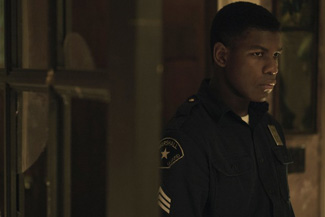The 400-Word Review: Detroit
By Sean Collier
August 8, 2017
BoxOfficeProphets.com

It’s a fascinating, innovative way of telling a story. And it’s very much to the credit of Bigelow and Boal that they dealt with such material in this artful, deliberate manner.
I only hope that their film reaches the minds it hopes to change.
In the summer of 1967, tensions in Detroit boiled into civil disobedience and rioting after an overzealous police raid on an unlicensed tavern. The film’s central setting is the most infamous (and germane) event of that period: After hearing shots, a group of Detroit police officers and (perhaps allegedly) National Guardsmen held several citizens at gunpoint inside a motel. It is no spoiler to say that blood was spilled; I won’t go so far as to report on the aftermath, but it will look familiar to anyone keeping up with the news.
Bigelow’s skill at assembling casts is unmatched, and Detroit is no exception. Anthony Mackie plays a soldier recently home from Vietnam in the wrong place at the wrong time; John Boyega plays a security guard thrust into the action; Will Poulter, the closest thing Detroit has to a lead, is a trigger-happy police officer; Jason Mitchell plays a cocky denizen of the motel. All, and more, give performances worthy of award consideration.
More than an excellent and compelling document of a shameful moment in history, Detroit presents — plainly and unambiguously — a representation of how police brutality begins, unfolds and reverberates. It is as convincing as it is powerful; in an era where movie tickets were bought on buzz and acclaim alone, it would be an important part of the national dialogue.
Can any film do that in 2017? Perhaps — but in the case of a film which does not hide its subject matter (not that Detroit should), I fear that anyone in a position to have their mind changed will be steered away from seeing it. I only hope that I’m wrong.
My Rating: 9/10
Sean Collier is the Associate Editor of Pittsburgh Magazine and a member of the Broadcast Film Critics Association. Read more from Sean at pittsburghmagazine.com/afterdark